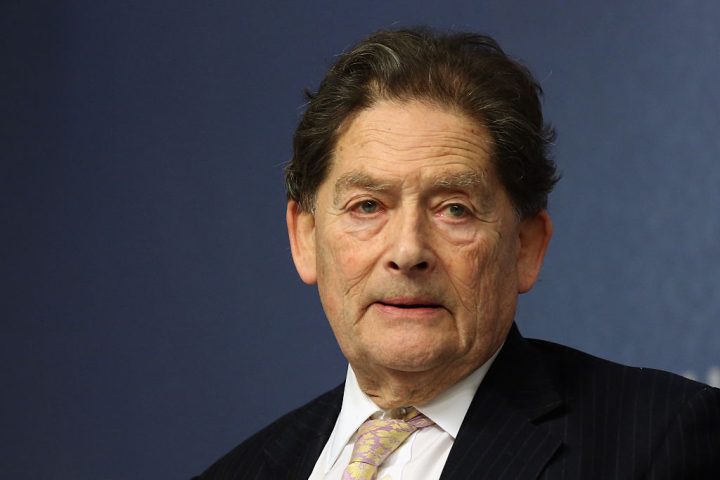The path from the editor’s chair at The Spectator to 11 Downing Street was not untrodden when Mrs Thatcher asked Nigel Lawson to replace Geoffrey Howe as Chancellor of the Exchequer after the 1983 general election. Iain Macleod had made the same journey in 1970. But whereas Macleod died 13 days into the job, Lawson went on to become Britain’s most significant post-war chancellor, and the architect of high Thatcherism.
You have to be at least 50 now to remember the stupor in which the British economy lay when Lawson took office. The statist economy of the 1970s, with its wretched labour disputes and under-performing nationalised industries had still not been fully dismantled. It is a tribute to Lawson that, when he left office in 1989 after six and a half years running the economy, Britain had been reborn as an enterprise economy.
We could do dearly now with the spirit of enterprise which Lawson unleashed upon an initially reluctant Britain
Unemployment had plunged by a million, and the economy was growing by five per cent a year – a rate we now associate more with developing economies such as China. Moreover, growth hadn’t been bought with high levels of public spending, as many economists seem now to think is essential: the government was running a surplus of £4.1 billion.
None of this happened by accident. It happened because Lawson effected a large shift towards private capital and private enterprise. Britons were incentivised once again to start businesses, to take financial risks and, for the first time in many cases, to invest directly in the stock market.
It was Lawson who put the Laffer Curve into action in Britain. Under him, tax ceased to be confiscatory. He reduced the basic rate of income tax from 30 per cent to 25 per cent and the upper rate from 60 per cent to 40 per cent, and he also abolished surcharges which, in Labour’s time, had created an effective marginal tax rate of 98 per cent for some.
The Thatcher privatisations were criticised by many for selling off the family silver too cheaply, but that misses the point. What was being sold was, indeed, public property, but the public was being invited to invest in it at what, in most cases (though not all), turned out to be attractive prices.
In the one case where the investment initially went badly wrong – BP, whose floatation coincided with the 1987 stock market crash – Lawson devised a scheme to buy back shares from disgruntled private shareholders, limiting their loss. Owning shares became, for the first time, a mass-participation sport. Today’s Individual Savings Accounts (ISAs) can be traced to the Personal Equity Plans (PEPs) that Lawson introduced. The only regret is that too many people offloaded their shares for a quick profit rather than holding them as long-term investments.
Yet Lawson’s ‘popular capitalism’ – as it was called at the time – was not supported by public debt, Liz Truss take note. Under Lawson’s command, sound public finances came first, and only when the government finances were in balance were taxes cut.
Lawson’s time was not without errors, however. By 1988, the economy was overheating thanks to a boom in private credit, and inflation was up to 8 per cent. His biggest mistakes were to cut interest rates in 1988 when he should have raised them and to announce a change in the rules over the tax treatment of mortgage repayments several months before they took effect.
The result was a mad rush to beat the deadline, pouring fuel on the fire of an already booming property market, and precipitating its eventual collapse. The housing crash, which left millions in ‘negative equity’, owing more on their mortgage than their home was worth – undermined the faith of many homeowners in capitalism; although far greater profits for property investors lay in the future.
Lawson not only had the right financial instincts, he could be astute politically, too, sometimes more so than his boss. It was thanks to him, in his role as energy secretary prior to becoming chancellor, that power stations were stocked with coal well ahead of the government’s clash with Arthur Scargill’s National Union of Mineworkers. The country managed to get through an 11 month strike without the lights going out, as they had done in the 1970s.
The former chancellor also opposed the poll tax, which was eventually to bring down Mrs Thatcher. His support for Britain joining the Exchange Rate mechanism, which pegged sterling to a narrow range of the Deutschmark, was less successful. A sceptical Thatcher gave into the demands to join – but Britain’s membership kept interest rates artificially high, prolonging the early 1990s recession.
The crisis of Black Wednesday tarnished the reputation of the Thatcher government, and Lawson’s role within it, allowing Gordon Brown to paint the Conservatives as the party of boom and bust. But we could do dearly now with the spirit of enterprise which Lawson unleashed upon an initially reluctant Britain – and which transformed Britain from basket case to a magnet for investment. The sadness is that by the time of Lord Lawson’s death, much of reform he initiated had been reversed, much to the detriment of economic growth and Britain’s standing in the world.







Comments